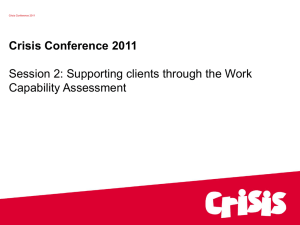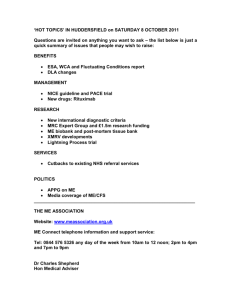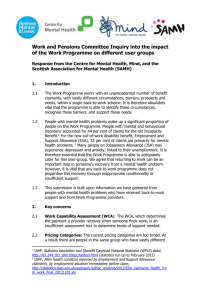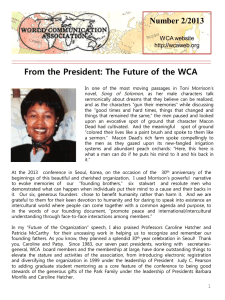Response by Papworth Trust to Dr Litchfield’s 5 Review of the
advertisement
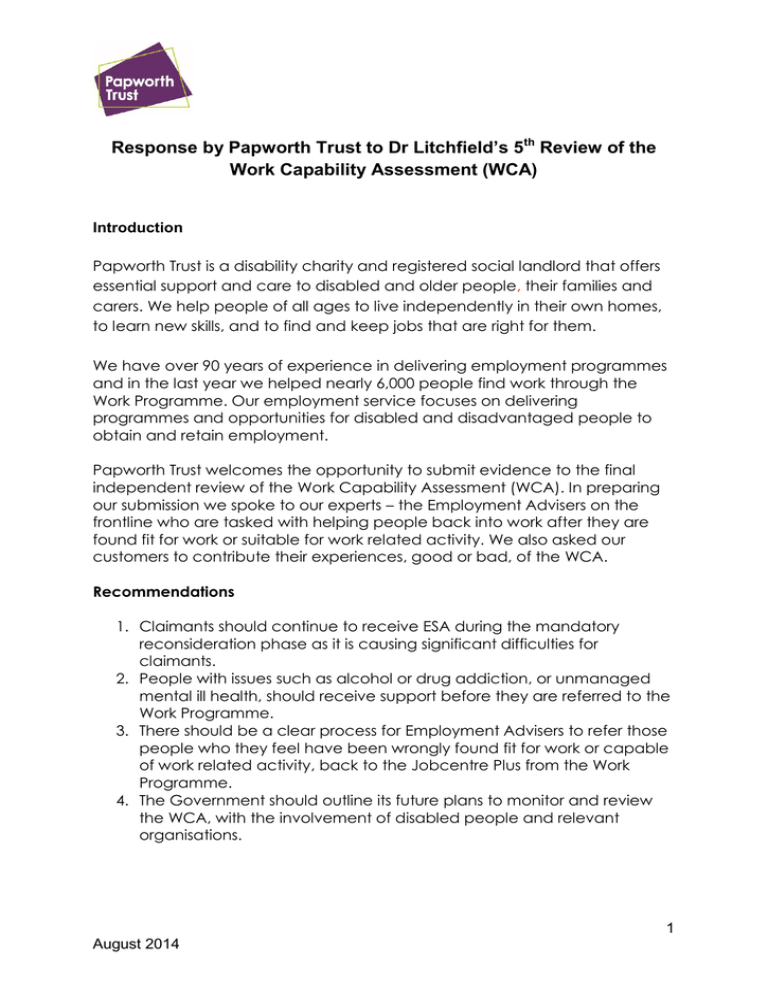
Response by Papworth Trust to Dr Litchfield’s 5th Review of the Work Capability Assessment (WCA) Introduction Papworth Trust is a disability charity and registered social landlord that offers essential support and care to disabled and older people, their families and carers. We help people of all ages to live independently in their own homes, to learn new skills, and to find and keep jobs that are right for them. We have over 90 years of experience in delivering employment programmes and in the last year we helped nearly 6,000 people find work through the Work Programme. Our employment service focuses on delivering programmes and opportunities for disabled and disadvantaged people to obtain and retain employment. Papworth Trust welcomes the opportunity to submit evidence to the final independent review of the Work Capability Assessment (WCA). In preparing our submission we spoke to our experts – the Employment Advisers on the frontline who are tasked with helping people back into work after they are found fit for work or suitable for work related activity. We also asked our customers to contribute their experiences, good or bad, of the WCA. Recommendations 1. Claimants should continue to receive ESA during the mandatory reconsideration phase as it is causing significant difficulties for claimants. 2. People with issues such as alcohol or drug addiction, or unmanaged mental ill health, should receive support before they are referred to the Work Programme. 3. There should be a clear process for Employment Advisers to refer those people who they feel have been wrongly found fit for work or capable of work related activity, back to the Jobcentre Plus from the Work Programme. 4. The Government should outline its future plans to monitor and review the WCA, with the involvement of disabled people and relevant organisations. 1 August 2014 Mandatory reconsiderations In our experience mandatory reconsiderations are causing additional difficulties for people going through the WCA because of the inability to claim ESA during the reconsideration phase and are left without income. Claimants who have been through the process are relying on friends and family for financial support while they are awaiting a decision. One customer who was living independently was forced to move back in with her family while awaiting a reconsideration decision, as she could no longer afford to live in the community. Our staff have seen other customers go into debt and rent arrears, and an increasing reliance on food banks. One customer said he had lived on beans on toast for 3 weeks as he was without income during the reconsideration process. There also seems to be variations in how long it takes to receive a reconsideration decision, from a few weeks to months. This is especially difficult as there is considerable confusion around whether claimants awaiting a reconsideration decision can claim Jobseeker’s Allowance (JSA) during this period. There appears to be a postcode lottery developing, with customers in some areas being told they cannot claim JSA by Jobcentre Plus as they are too sick to fulfil the conditions, whilst customers in other areas have been able to claim JSA as a temporary measure but without the conditions attached. We recommend that, on the basis of the extreme difficulties claimants are facing during the mandatory reconsideration stage, they should continue to receive the assessment phase rate of ESA until they receive the reconsideration decision provided they have applied for that reconsideration within a set period of time. The WRAG and Support Group Our Employment Advisors generally did not believe that the WCA works well in differentiating between those claimants who should in the Support Group or Work Related Activity Group (WRAG). More widely they believe the WCA is not particularly good at sorting between those fit for work and those unable to work. We have found that some people referred to the Work Programme in the WRAG are transferred into the Support Group within a matter of weeks. We continue to receive customers who are not ready to begin their journey back to work, because they are trying to overcome issues in their lives such as drug and alcohol addictions, severe mental health conditions, terminal cancer, 2 August 2014 severe brain injury or a life-limiting heart condition – who have all been placed in the WRAG. In our experience, people with such conditions referred to the Work Programme are only further demoralised and less likely to begin their journey to work until they are able to overcome these barriers. Mental Health and Learning Difficulties The WCA continues to present problems in identifying between people with mild, moderate and severe mental ill health and learning disabilities. These groups in particular need professional support to successfully navigate the WCA and receive the right decision. However, in Papworth Trust’s experience people with mental ill health placed in the WRAG are able to access the support they need through the Work Programme, such as access to therapies. This is very beneficial in helping them work towards recovery and motivate them, but does not necessarily move them into work. Other considerations The length of wait for an assessment is creating problems for individuals and Work Programme providers. One former ESA claimant (now in work) said that he was very discouraged from trying to find work , as although he did want to work, it had taken so long for him to receive the right ESA decision and gain stability in his income, that the idea of coming off benefits and entering work scared him. Papworth Trust has found that many ESA customers are very keen to engage with the Work Programme. This is because it offers them social interaction and support, as customers can struggle with loneliness and isolation. As this is the fifth and final review of the WCA, Papworth Trust recommends that the Government outlines its future plans to monitor and review the WCA, ensuring the views of disabled people and relevant organisations are able to contribute to checking the process in future. For further information, please contact: Nina Zamo, Policy and Campaigns Officer, Papworth Trust nina.zamo@papworthtrust.org.uk 01480 357255 3 August 2014
